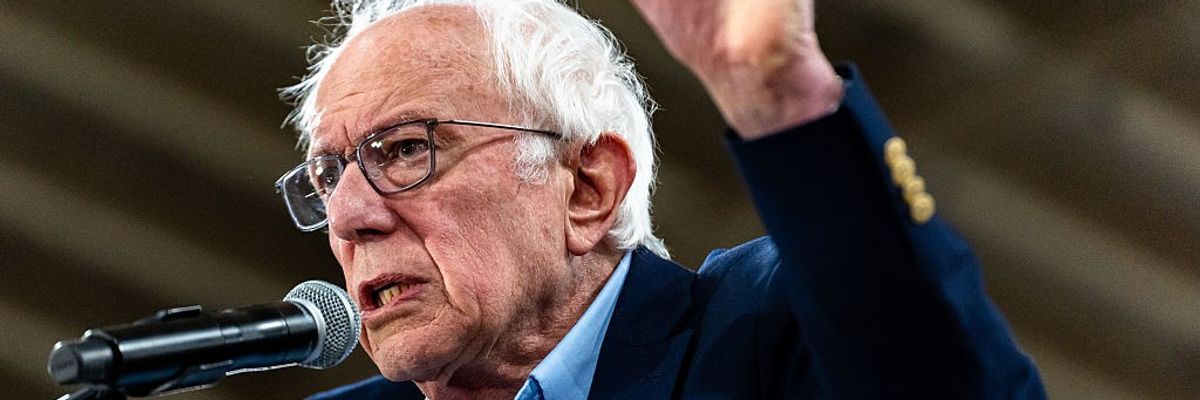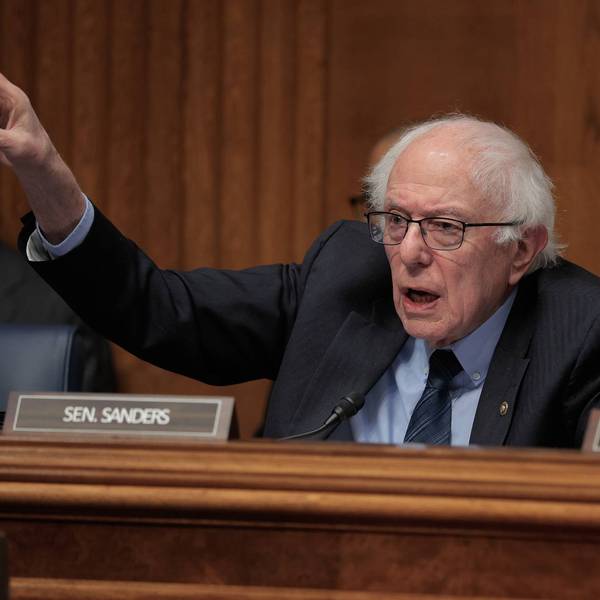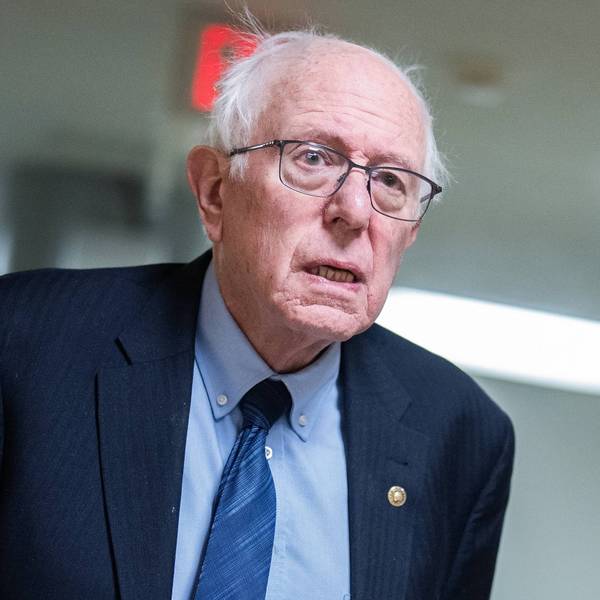
Senator Bernie Sanders (I-Vt.) speaks at the Fighting Oligarchy rally in Harrisburg, Pennsylvania on May 2, 2025.
'What Oligarchy Looks Like!' Sanders Blasts Anti-Worker SpaceX Ruling
Sanders charged that the ruling gave "Elon Musk... and other union busters the absolute power to exploit workers and violate labor law with impunity."
US Sen. Bernie Sanders on Wednesday evening warned that a ruling by the 5th Circuit Court of Appeals, which struck down a law that shielded National Labor Relations Board judges from being fired at will by the White House, would give union-busting employers yet another advantage in a legal system that is already stacked in their favor.
As Reuters reported, the appeals court ruled that protections for administrative judges at the board were unconstitutional impediments to the president's ability to run the executive branch as he sees fit.
"This is what oligarchy looks like," Sanders wrote in a post on X. "Today, two Trump judges ruled that the NLRB's structure is unconstitutional giving [SpaceX CEO] Elon Musk, worth $410 billion, and other union busters the absolute power to exploit workers and violate labor law with impunity. This disastrous decision cannot stand."
Circuit Judge Don Willett, a Trump appointee, wrote that "because the executive power remains solely vested in the president, those who exercise it on his behalf must remain subject to his oversight," meaning that the president should have more power to dismiss judges.
As a result of the ruling, National Labor Relations Board (NLRB) cases against SpaceX, pipeline operator Energy Transfer, and social services search engine Aunt Bertha have for now been put on hold, although NLRB is expected to appeal the ruling.
California-based law firm CDF Labor Law explained that, under the 1935 National Labor Relations Act, the president could only fire NLRB board members for "neglect of duty or malfeasance in office," and could only remove NLRB administrative judges for "good cause" after undergoing a hearing conducted by a separate agency.
New York-based labor attorney Benjamin Dictor warned that this ruling could ultimately leave the US labor movement with little recourse when employers violate workers' rights.
"Right now, the NLRB is the only federal body that investigates unfair labor practices, certifies unions, and compels bargaining. If it's defunct, there is no backup system," wrote Dictor. "That means workers fired for union activity? No remedy. Employers refusing to bargain? No consequences. Organizing elections? Suspended indefinitely."
If federal courts eventually rule that the NLRB is unconstitutional, he added, "it won't just be a US labor crisis. It could put the US out of compliance with its obligations under international law."
He then explained that the US has obligations as a member of the International Labor Organization (ILO) and that gutting NLRB would throw international labor standards into chaos.
"In ILO terms, that's the US failing to ensure even basic compliance with freedom of association and collective bargaining standards," he said. "It's not just a domestic constitutional question. It's the US signaling to the world that workers' rights are optional—and that's exactly what the ILO was created to prevent... The stakes are global."
An Urgent Message From Our Co-Founder
Dear Common Dreams reader, The U.S. is on a fast track to authoritarianism like nothing I've ever seen. Meanwhile, corporate news outlets are utterly capitulating to Trump, twisting their coverage to avoid drawing his ire while lining up to stuff cash in his pockets. That's why I believe that Common Dreams is doing the best and most consequential reporting that we've ever done. Our small but mighty team is a progressive reporting powerhouse, covering the news every day that the corporate media never will. Our mission has always been simple: To inform. To inspire. And to ignite change for the common good. Now here's the key piece that I want all our readers to understand: None of this would be possible without your financial support. That's not just some fundraising cliche. It's the absolute and literal truth. We don't accept corporate advertising and never will. We don't have a paywall because we don't think people should be blocked from critical news based on their ability to pay. Everything we do is funded by the donations of readers like you. Will you donate now to help power the nonprofit, independent reporting of Common Dreams? Thank you for being a vital member of our community. Together, we can keep independent journalism alive when it’s needed most. - Craig Brown, Co-founder |
US Sen. Bernie Sanders on Wednesday evening warned that a ruling by the 5th Circuit Court of Appeals, which struck down a law that shielded National Labor Relations Board judges from being fired at will by the White House, would give union-busting employers yet another advantage in a legal system that is already stacked in their favor.
As Reuters reported, the appeals court ruled that protections for administrative judges at the board were unconstitutional impediments to the president's ability to run the executive branch as he sees fit.
"This is what oligarchy looks like," Sanders wrote in a post on X. "Today, two Trump judges ruled that the NLRB's structure is unconstitutional giving [SpaceX CEO] Elon Musk, worth $410 billion, and other union busters the absolute power to exploit workers and violate labor law with impunity. This disastrous decision cannot stand."
Circuit Judge Don Willett, a Trump appointee, wrote that "because the executive power remains solely vested in the president, those who exercise it on his behalf must remain subject to his oversight," meaning that the president should have more power to dismiss judges.
As a result of the ruling, National Labor Relations Board (NLRB) cases against SpaceX, pipeline operator Energy Transfer, and social services search engine Aunt Bertha have for now been put on hold, although NLRB is expected to appeal the ruling.
California-based law firm CDF Labor Law explained that, under the 1935 National Labor Relations Act, the president could only fire NLRB board members for "neglect of duty or malfeasance in office," and could only remove NLRB administrative judges for "good cause" after undergoing a hearing conducted by a separate agency.
New York-based labor attorney Benjamin Dictor warned that this ruling could ultimately leave the US labor movement with little recourse when employers violate workers' rights.
"Right now, the NLRB is the only federal body that investigates unfair labor practices, certifies unions, and compels bargaining. If it's defunct, there is no backup system," wrote Dictor. "That means workers fired for union activity? No remedy. Employers refusing to bargain? No consequences. Organizing elections? Suspended indefinitely."
If federal courts eventually rule that the NLRB is unconstitutional, he added, "it won't just be a US labor crisis. It could put the US out of compliance with its obligations under international law."
He then explained that the US has obligations as a member of the International Labor Organization (ILO) and that gutting NLRB would throw international labor standards into chaos.
"In ILO terms, that's the US failing to ensure even basic compliance with freedom of association and collective bargaining standards," he said. "It's not just a domestic constitutional question. It's the US signaling to the world that workers' rights are optional—and that's exactly what the ILO was created to prevent... The stakes are global."
US Sen. Bernie Sanders on Wednesday evening warned that a ruling by the 5th Circuit Court of Appeals, which struck down a law that shielded National Labor Relations Board judges from being fired at will by the White House, would give union-busting employers yet another advantage in a legal system that is already stacked in their favor.
As Reuters reported, the appeals court ruled that protections for administrative judges at the board were unconstitutional impediments to the president's ability to run the executive branch as he sees fit.
"This is what oligarchy looks like," Sanders wrote in a post on X. "Today, two Trump judges ruled that the NLRB's structure is unconstitutional giving [SpaceX CEO] Elon Musk, worth $410 billion, and other union busters the absolute power to exploit workers and violate labor law with impunity. This disastrous decision cannot stand."
Circuit Judge Don Willett, a Trump appointee, wrote that "because the executive power remains solely vested in the president, those who exercise it on his behalf must remain subject to his oversight," meaning that the president should have more power to dismiss judges.
As a result of the ruling, National Labor Relations Board (NLRB) cases against SpaceX, pipeline operator Energy Transfer, and social services search engine Aunt Bertha have for now been put on hold, although NLRB is expected to appeal the ruling.
California-based law firm CDF Labor Law explained that, under the 1935 National Labor Relations Act, the president could only fire NLRB board members for "neglect of duty or malfeasance in office," and could only remove NLRB administrative judges for "good cause" after undergoing a hearing conducted by a separate agency.
New York-based labor attorney Benjamin Dictor warned that this ruling could ultimately leave the US labor movement with little recourse when employers violate workers' rights.
"Right now, the NLRB is the only federal body that investigates unfair labor practices, certifies unions, and compels bargaining. If it's defunct, there is no backup system," wrote Dictor. "That means workers fired for union activity? No remedy. Employers refusing to bargain? No consequences. Organizing elections? Suspended indefinitely."
If federal courts eventually rule that the NLRB is unconstitutional, he added, "it won't just be a US labor crisis. It could put the US out of compliance with its obligations under international law."
He then explained that the US has obligations as a member of the International Labor Organization (ILO) and that gutting NLRB would throw international labor standards into chaos.
"In ILO terms, that's the US failing to ensure even basic compliance with freedom of association and collective bargaining standards," he said. "It's not just a domestic constitutional question. It's the US signaling to the world that workers' rights are optional—and that's exactly what the ILO was created to prevent... The stakes are global."

